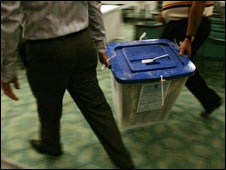Moroccan Islamists were hopeful of victory in Friday's parliamentary election, which was held after the adoption last summer of a new constitution that gave greater powers to lawmakers in the North African kingdom following the Arab Spring uprisings, dpa reported.
Abdelilah Benkirane, secretary-general of the moderate Islamist Party of Justice and Development (PJD), said he hoped the party would pass from opposition into government.
Under the new constitution, which Moroccans approved in a July referendum, the king, who retains full authority over the military and religious affairs, must chose the next prime minister from the party that wins most seats in parliament.
"Voting for the PJD means voting in favour of a programme to solve the problems the country is facing, especially in the areas of education and health," Benkirane said.
Observers gave the PJD - currently the second-largest bloc in parliament - good chances of victory, pointing to Islamists in neighbouring Tunisia who last month won the country's first democratic election after a popular uprising.
Government spokesman Khalid Naciri also hailed a "historic transition."
King Mohammed VI, who hails from a monarchy that has ruled Morocco for 350 years, introduced reforms in a new constitution last summer to try an appease disenchanted Moroccans and prevent a popular revolt against his rule similar to uprisings that toppled autocrats in Tunisia, Egypt and Libya.
About 13.5 million people were eligible to vote in the election, which sees more than 7,000 candidates from 33 parties vie for a seat in parliament. King Mohammed called the election almost a year ahead of time.
The new constitution also grants more powers to the prime minister and parliament.
The biggest party in the outgoing parliament is the nationalist party Istiqlal, whose leader Abbas el-Fassi heads a coalition government.
The PJD also faces a challenge from the newly formed Coalition for Democracy, an alliance of eight parties that includes a pro-monarchy group.
Morocco's proportional representation system makes it difficult for any party to win an absolute majority. If the PJD won the elections, it would probably have to form a coalition with secularist parties.
Morocco's February 20 protest movement, which has been trying to emulate Arab Spring uprisings in Egypt and Tunisia, called on citizens to boycott the elections. It says the constitutional reforms are insufficient.
Thousands of February 20 activists held protests against the election in several Moroccan cities.
Turnout was about 22.4 per cent by the afternoon. Polls were due to close at 9 pm (2100 GMT).
Sixty of the 395 parliamentary seats are reserved exclusively for women, and 30 seats for young people.
About 4,000 national and international observers were present to ensure transparency amid PJD concern that the elections may be rigged to keep it out of power.






